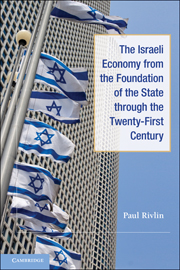Book contents
- Frontmatter
- Contents
- Figures
- Tables
- Appendices
- Preface
- The Israeli Economy from the Foundation of the State through the 21st Century
- One Introduction
- Two The Economy of the Yishuv and Its Legacy
- Three The Economy, 1948–1985
- Four Macro-Economic Developments, Growth, and Policy
- Five Globalization and High Technology
- Six Defense: Service or Burden?
- Seven Israel and the Palestinians
- Eight The Economics of Religion
- Nine The Arab Minority
- Ten Demographic Developments and Socioeconomic Divisions
- Eleven Conclusions
- Appendices
- References
- Index
Five - Globalization and High Technology
Published online by Cambridge University Press: 05 June 2012
- Frontmatter
- Contents
- Figures
- Tables
- Appendices
- Preface
- The Israeli Economy from the Foundation of the State through the 21st Century
- One Introduction
- Two The Economy of the Yishuv and Its Legacy
- Three The Economy, 1948–1985
- Four Macro-Economic Developments, Growth, and Policy
- Five Globalization and High Technology
- Six Defense: Service or Burden?
- Seven Israel and the Palestinians
- Eight The Economics of Religion
- Nine The Arab Minority
- Ten Demographic Developments and Socioeconomic Divisions
- Eleven Conclusions
- Appendices
- References
- Index
Summary
Globalization is a process that involves increased interaction and integration among people, companies, and governments in different countries. It has been driven by international trade and investment and has been reinforced by the development and use of information and communication technology. Globalization has had effects on economic development, political systems, culture, the environment, and human welfare and has played a major role in the development of the Israeli economy in recent years.
The most significant consequence of this has been the development of the high-technology sector. Since the 1960s, the Israeli economy has become increasingly internationalized with the move from import substitution to export promotion. This was achieved by signing free trade agreements with the European Community in the 1960s and 1970s and with the United States in the 1980s. In the 1990s, Israel liberalized its trade with so-called third-world countries, with which it did not have bilateral trade agreements. During that decade, it entered into what has been called the globalized economy, one in which a much wider range of policies were adjusted in order to attain and maintain internationally acceptable standards. Perhaps the most significant of these were limits on public spending, borrowing, and debt. Globalization accelerated the pace of change. An increasing number of people traveled abroad for work on a regular basis in the high-technology sector, especially to the United States. The availability of personal computers, the internet, cable and satellite television, and cheaper telephone communication, as well as increasing travel abroad affected the way people thought and behaved. Through the new media, many Israelis increasingly lived in what Herbert Marcuse called the “world village.” Israel has become a consumer-orientated society in which the new media and advertising played an increasing role. This encouraged a shift in values from collectivism to individualism, something favored by conventional economics, but which comes, as will be seen, with a cost.
- Type
- Chapter
- Information
- Publisher: Cambridge University PressPrint publication year: 2010
- 3
- Cited by



